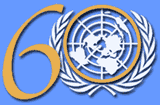GENEVA, Switzerland
August 18 (UNHCR)
UNHCR staff will join colleagues from other UN and non-governmental organizations on Wednesday in observing the first World Humanitarian Day, honouring those who have been injured or killed while carrying out their humanitarian work.
The day, which is also Staff Memorial Day, was established by the UN General Assembly last December and is especially poignant for UNHCR, which lost three members of staff to attacks this year in Pakistan. They were among 30 UNHCR staff members killed while performing their duties since 1987.
The date commemorates the specific day in 2003 on which the UN office in Iraq was bombed, killing 22 people including Sergio Vieira de Mello, a UNHCR veteran who was UN High commissioner for Human Rights and a Special Representative to the UN secretary general at the time.
"How do we meet the life-or-death needs of the world's most vulnerable people while making sure those who provide that help are kept safe?" High Commissioner António Guterres wrote in a newspaper article this month. "Our ability to assist those who need it most is being severely tested by the shrinkage of the so-called 'humanitarian space' in which we must work. The nature of conflict is changing, with a multiplicity of armed groups -- some of whom view humanitarians as legitimate targets."
How do we meet the life-or-death needs of the world's most vulnerable people while making sure those who provide that help are kept safe?
August 18 (UNHCR)
UNHCR staff will join colleagues from other UN and non-governmental organizations on Wednesday in observing the first World Humanitarian Day, honouring those who have been injured or killed while carrying out their humanitarian work.
The day, which is also Staff Memorial Day, was established by the UN General Assembly last December and is especially poignant for UNHCR, which lost three members of staff to attacks this year in Pakistan. They were among 30 UNHCR staff members killed while performing their duties since 1987.
The date commemorates the specific day in 2003 on which the UN office in Iraq was bombed, killing 22 people including Sergio Vieira de Mello, a UNHCR veteran who was UN High commissioner for Human Rights and a Special Representative to the UN secretary general at the time.
"How do we meet the life-or-death needs of the world's most vulnerable people while making sure those who provide that help are kept safe?" High Commissioner António Guterres wrote in a newspaper article this month. "Our ability to assist those who need it most is being severely tested by the shrinkage of the so-called 'humanitarian space' in which we must work. The nature of conflict is changing, with a multiplicity of armed groups -- some of whom view humanitarians as legitimate targets."
How do we meet the life-or-death needs of the world's most vulnerable people while making sure those who provide that help are kept safe?
– High Commissioner António Guterres
Among the events marking the day, Mr. Guterres will speak along with the Staff Council at a ceremony for staff in the Geneva headquarters. Later he will speak at a commemorative event in Geneva's Parc des Bastions organized by OCHA and the Sergio Vieira de Mello Foundation.
Last year 260 humanitarian aid workers were killed, kidnapped or seriously injured in attacks, the highest yearly toll on record. The average number of attacks in the last three years has been three times the level of the previous nine years.
In February of 2009, veteran UNHCR driver Syed Hashim was shot dead in Pakistan during the kidnapping of John Solecki, the head of our Quetta sub-office on 2 February. Mr. Solecki was released in April after two months in captivity.
In June, Aleksandar Vorkapic, a UNHCR staff member on emergency duty helping Pakistanis displaced by fighting in North West Frontier Province died in the bombing of the Pearl Continental hotel in Peshawar. And in July, UNHCR senior field assistant Zill-e-Usman was gunned down in a camp for internally displaced Pakistanis in Peshawar by unknown assailants.
With operations in some of the world's most dangerous locations, the killings have prompted a thorough review of UNHCR security procedures. UNHCR Deputy High Commissioner L. Craig Johnstone is in Pakistan talking to staff and local officials about the security situation this week.
"With the evolving nature of armed conflict and the changing attitudes of some belligerents, the deliberate targeting of humanitarian workers has increased, establishing a tension -- and in some situations a contradiction -- between the imperatives of staff safety and humanitarian action," said Mr. Guterres.
"UNHCR has continuously struggled to determine the 'acceptable' level of security risk to which its staff members can be exposed," he said. "As this month's commemoration demonstrates, it is a truly terrible dilemma."
Despite those risks – which have taken the lives of more than 700 humanitarian workers over the last decade – the staff of UNHCR and similar organizations continue to help those in need around the world. World Humanitarian Day is an opportunity both to remember those who have been killed or injured and to honour those continuing to carry out their humanitarian work despite the danger.







